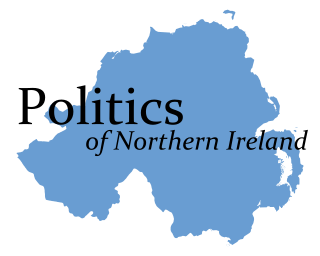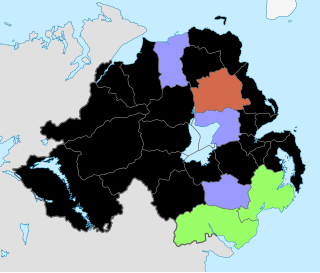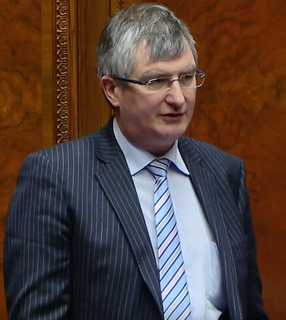Related Research Articles

The Ulster Unionist Party (UUP) is a unionist political party in Northern Ireland. Having gathered support in Northern Ireland during the late-nineteenth and early-twentieth centuries, the party governed Northern Ireland between 1921 and 1972. It was supported by most unionist voters throughout the conflict known as the Troubles, during which time it was often referred to as the Official Unionist Party (OUP). Between 1905 and 1972 its MPs took the Conservative whip at Westminster, considered as part of the Conservative Party.

Elections in Northern Ireland are held on a regular basis to local councils, the Northern Ireland Assembly, the Parliament of the United Kingdom, and to the European Parliament.
The Commonwealth Labour Party (CWLP) was a minor political party in Northern Ireland. The party was founded in 1942 by Harry Midgley, former leader of the Northern Ireland Labour Party (NILP), in order to pursue his brand of labour unionism.

The Northern Ireland Assembly elections were held on 20 October 1982 in an attempt to re-establish devolution and power-sharing in Northern Ireland. Although the Northern Ireland Assembly officially lasted until 1986 it met infrequently and achieved very little.
Independent Unionist has been a label sometimes used by candidates in elections in the United Kingdom, indicating a support for British unionism.
The Belfast South by-election was held on 4 March 1982 following the death of Robert Bradford, Ulster Unionist Party (UUP) Member of Parliament for Belfast South.

The Northern Ireland Assembly was a legislative assembly set up by the Government of the United Kingdom on 3 May 1973 to restore devolved government to Northern Ireland with the power-sharing Northern Ireland Executive made up of unionists and nationalists. It was abolished by the Northern Ireland Act 1974.
A power-sharing Northern Ireland Executive was formed following the Northern Ireland Assembly elections of 1973. The executive served as the devolved government of Northern Ireland from 1 January 1974 until its collapse on 28 May 1974.

Elections for local government were held in Northern Ireland in May 1977.
The Belfast South by-election, 1952 was held following the resignation of Ulster Unionist Party (UUP) Member of Parliament, Hugh Gage.

An election for the leadership of the Ulster Unionist Party (UUP) was held on 22 September 2010.

The 2005 United Kingdom general election in Northern Ireland was held on 5 May 2005 and all 18 seats in Northern Ireland were contested. The election resulted in the Ulster Unionist Party losing its place as the largest Northern Irish political party at Westminster, being replaced by the Democratic Unionist Party. Both the DUP and Sinn Féin increased their share of the vote as well as their number of seats. The Social Democratic and Labour Party were unable to regain its formerly held status as the largest nationalist political party in Northern Ireland, though they retained 3 seats overall, albeit with a reduced share of the vote.
The Belfast East by-election of 1940 was held on 8 February 1940. The by-election was held due to the elevation to the peerage of the incumbent UUP MP, Herbert Dixon. It was won by the UUP candidate Henry Peirson Harland, who was unopposed.
The Londonderry by-election of 1929 was held on 29 January 1929. The by-election was held due to the appointment as high court judge of the incumbent UUP MP, Malcolm Macnaghten. It was won by the UUP candidate Ronald Deane Ross.
The North Down by-election of 1922 was held on 21 July 1922. The by-election was held due to the assassination of the incumbent UUP MP, Henry Wilson who had been elected in the February 1922 North Down by-election. It was won unopposed by the UUP candidate John Morrow Simms.
The North Londonderry by-election of 1922 was held on 2 June 1922. The by-election was held due to the death of the incumbent UUP MP, Hugh T. Barrie. It was won by the UUP candidate Malcolm Macnaghten.
The South Londonderry by-election of 1922 was held on 18 January 1922. The by-election was held due to the death of the incumbent UUP MP, Robert Chichester. It was won by the UUP candidate Sir William Hacket Pain.
The South Londonderry by-election of 1921 was held on 29 August 1921. The by-election was held due to the appointed lord chief justice of northern ireland of the incumbent UUP MP, Denis Henry. It was won by the UUP candidate Robert Chichester.
The West Down by-election of 1921 was held on 5 July 1921. The by-election was held due to the appointment as Recorder of Belfast of the incumbent UUP MP, Daniel Martin Wilson. It was unopposed and the UUP candidate Thomas Browne Wallace was elected.

The 2017 election to the Northern Ireland Assembly was held on 2 March 2017. The election was held to elect members (MLAs) following the resignation of deputy First Minister Martin McGuinness in protest over the Renewable Heat Incentive scandal. McGuinness' position was not filled, and thus by law his resignation triggered an election. It was the sixth election since the Assembly was re-established in 1998, and the first to implement a reduction in size to 90 MLAs.
References
- ↑ "Leigh Rayment - Commons". leighrayment.com.
- 1 2 British Parliamentary Election Results 1918-1949, compiled and edited by F. W. S. Craig (The Macmillan Press 1977)
| This Elections in Northern Ireland related article is a stub. You can help Wikipedia by expanding it. |
| This by-elections to the Parliament of the United Kingdom in Ireland-related article is a stub. You can help Wikipedia by expanding it. |